Nepal man, 101, pulled alive from rubble 7 days after quake
Focus shifts to helping survivors in remote areas as Unicef warns of 'race against time' to help 1.7 million children at risk from disease
PUBLISHED : Saturday, 02 May, 2015, 6:40pm
UPDATED : Monday, 04 May, 2015, 12:31am
Agencies in Kathmandu
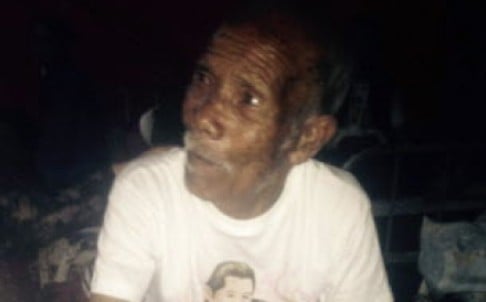
Funchu Tamang, 101, sits on a bed in a hospital in Nuwakot district with minor injuries. Photo: AFP
A 101-year-old man was pulled alive from the rubble of his house in Nepal seven days after it collapsed in a deadly earthquake, police said Sunday.
Funchu Tamang was rescued on Saturday with only minor injuries and airlifted to a district hospital, said local police officer Arun Kumar Singh.
“He was brought to the district hospital in a helicopter. His condition is stable,” said Singh in Nuwakot district around 80 kilometres (50 miles) northwest of Kathmandu.
“He has injuries on his left ankle and hand. His family is with him.”
The death toll from an earthquake that ripped through Nepal will climb “much higher”, the government warned Sunday, as relief teams raced to reach survivors of the disaster that has already claimed more than 7,000 lives.
Finance Minister Ram Sharan Mahat said the toll will jump once teams reached far-flung villages feared flattened in the worst quake to hit the impoverished Himalayan nation in more than 80 years.
“There are still villages where we know that all houses have been destroyed, but have not yet been able to reach,” Mahat said in a statement.
“The aftershocks have not receded and we expect the final casualty numbers to climb much higher,” the minister said, as he appealed for hundreds of millions of dollars in foreign donations to help rebuild the devastated country.
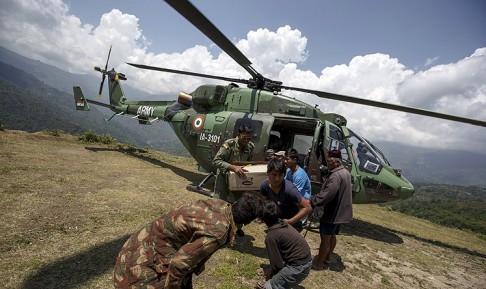
Soldiers and survivors unload relief supplies from an Indian Army helicopter near Sirdibas, Nepal. Photo: Reuters
The UN children's fund, Unicef, warned of a race against time to avert an outbreak of disease among the 1.7 million youngsters estimated to be living in the worst-hit areas, with monsoon rains only a few weeks away.
The 7.8-magnitude quake wreaked a trail of death and destruction when it erupted around midday eight days ago, reducing much of the capital Kathmandu to rubble and triggering a deadly avalanche on Mount Everest.
"It has been one week since the disaster," home ministry spokesman Laxmi Prasad Dhakal said. "We are trying our best in rescue and relief work, but now I don't think there is any possibility of survivors under the rubble."
Dhakal said 6,621 people had been killed and 14,023 injured. The numbers of foreigners that were killed still remained unclear, with about 1,000 European Union citizens still unaccounted for in Nepal, diplomats have said.
While multiple teams of rescuers from more than 20 countries have been using sniffer dogs and heat-seeking equipment to find survivors in the rubble, no one has been pulled alive since Thursday evening.
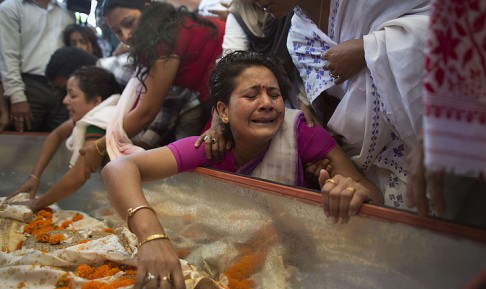
Meghali Mazumdar cries near the coffin of her mother-in-law, a victim of the earthquake. Photo: AP
More than 100 people were also killed in neighbouring India and China.
Some Nepalese have blamed corrupt politicians for bringing devastation to the Himalayan nation. Others fault Western tourists with tight T-shirts and loose morals. But among many of Nepal's most devoutly religious, the destruction wrought makes one thing clear - the gods are angry. Many find comfort in the notion that there was a divine and just cause behind the tragedy.
"It's a warning from the gods to the politicians: change yourselves, or who knows what will happen," said Ishwar Nath Yogi, the 51-year-old high priest at Gorkha Kalika, a revered temple to the goddess Kali and the birthplace of Nepal's first king.
Yogi was certain the Hindu goddess of death and destruction had saved him and the many others who were praying in the 17th century temple as the red bricks of its walls began crashing down during the massive earthquake on April 25.
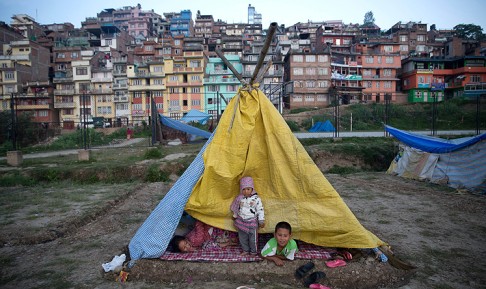
A Nepalese family sit in their makeshift tent shelter at Kritipur in the Kathmandu Valley. Photo: AFP
Those less fortunate were unlucky, the yellow-robed holy man said, or maybe even undeserving. He suggested that perhaps they did not pray enough, or did not revere their sacred cattle; maybe they embraced Western cultures and lost their own traditions.
"We are a Hindu nation," he explained - a place where dressing conservatively was a given. "Look at the Americans, the Japanese, they run around half naked. That's why the gods were mad."
Three-fourths of Nepal's 27 million people consider themselves Hindu, and the religion has a deep connection to the rugged Himalayan land dotted with countless temples and shrines.
The king has long been worshipped by many as an incarnation of the Hindu god Vishnu.
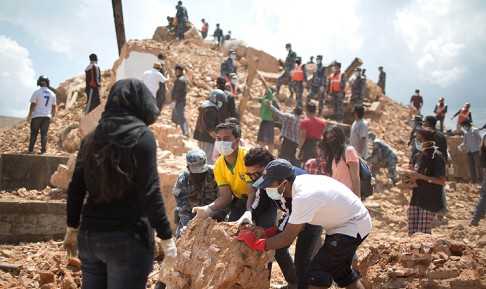
Civilians and police clear rubble at the Narayan temple in Kathmandu on Saturday. Photo: AFP
Even as Nepal modernised in recent decades, many of its traditional beliefs remain deeply felt. "My god is up there," said Sushma Kanwar, 23, cradling a baby in her lap as she pointed at the hilltop temple to Kali. "Somebody must have done something very bad. There is so much that could have angered the gods: theft, corruption, murder. These things are only getting worse."
Although Kanwar and her family lost their home and everything in it, she still feels blessed, and prays to Kali with greater penitence. "Everyone in this village, our houses are destroyed, but no one has died. Of course, this is the work of the goddess."
Agence France-Presse and Associated Press
